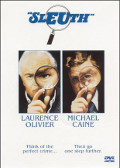
Directed by
Joseph L. Mankiewicz
138 minutes
Rated PG
Reviewed by
Bernard Hemingway

Sleuth (1972)
Joseph L. Mankiewicz’s adaptation of Anthony Shaffer's stage play (Shaffer also is credited with the screenplay) is highly regarded but somewhat too highly. It’s witty in the best tradition of stagecraft but not so successful in filmic form.
Michael Caine and Laurence Olivier are effectively the only two actors in a complicated cat and muse game between an older cuckold, Andrew Wyke (Olivier), a posh murder mystery writer and a young stud, Milo Tindle (Caine), a lower class hairdresser who has stolen his wife. Wyke invites TIndle to his home where he proceeds to humiliate the man with a complicated mind game and the play follows Tindle’s attempt to regain and retain his self-esteem.
For a start as a study of psychological cruelty Shaffer’s text doesn’t have the power of Edward Albee’s searing play filmed by Mike Nichols, Who Afraid of Virginia Woolf?, It’s much more a parlour game that entertains with its twists and turns, in this respect staying very much within the confines of Wyke's world, which Mankiewicz rather nicely represents with a garden maze at the film’s opening.
There is a deeper theme and that is the class divide and Tindle’s struggle to overthrow his to-the-manor-born “better”, something that would have had much more relevance in its day, but this fails to resonate because of Caine’s performance. Admittedly he has the harder part (Olivier is simply playing the toff) but Caine is essentially a character actor and he is unable to emote across the full spectrum. Hence his pivotal breakdown scene fails to bring home the essential point of Tindle’s humiliation on which the meat of the play relies.
Divided into two acts the play keeps us engaged with its ludic permutations although Mankiewicz does cheat somewhat in order to accommodate the different order of expectations that cinema encourages compared to theatre where suspension of disbelief is a necessary given. Plotwise, the second half of the film doesn’t stand too much scrutiny and this is why compared to the Nichol’s film it is essentially a clever comedy of manners.
Want something different?





